Hilton International: PEST Analysis, Sustainability, and Overview
VerifiedAdded on 2021/01/02
|11
|3459
|105
Report
AI Summary
This report provides a comprehensive analysis of Hilton International, a major player in the hospitality, tourism, and events sector. It begins with an overview of the organization, highlighting its customer-centric approach, global presence, and commitment to sustainable tourism. The main body delves into Hilton's sustainability efforts, examining its goals for 2030, its initiatives to reduce environmental impact, and its focus on employee training and development in sustainability practices. The report then conducts a PEST (Political, Economic, Social, and Technological) analysis to assess the external factors influencing Hilton's operations, including the impact of Brexit, economic trends, social changes, and technological advancements. The analysis considers the political and economic implications, social influences, and technological adaptations that affect the company's performance and strategic decisions, concluding with an overview of the industry's future and Hilton's position within it.
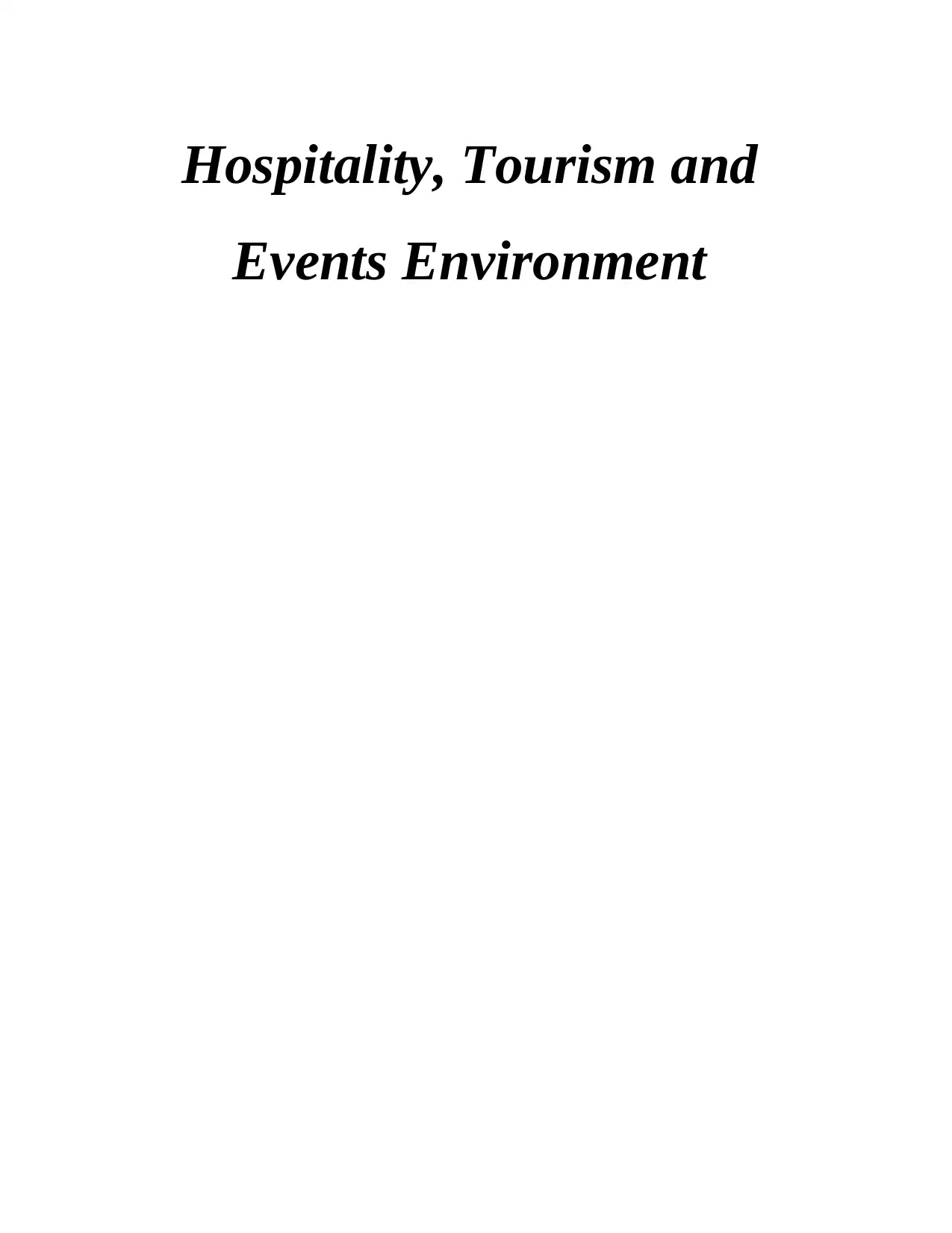
Hospitality, Tourism and
Events Environment
Events Environment
Paraphrase This Document
Need a fresh take? Get an instant paraphrase of this document with our AI Paraphraser
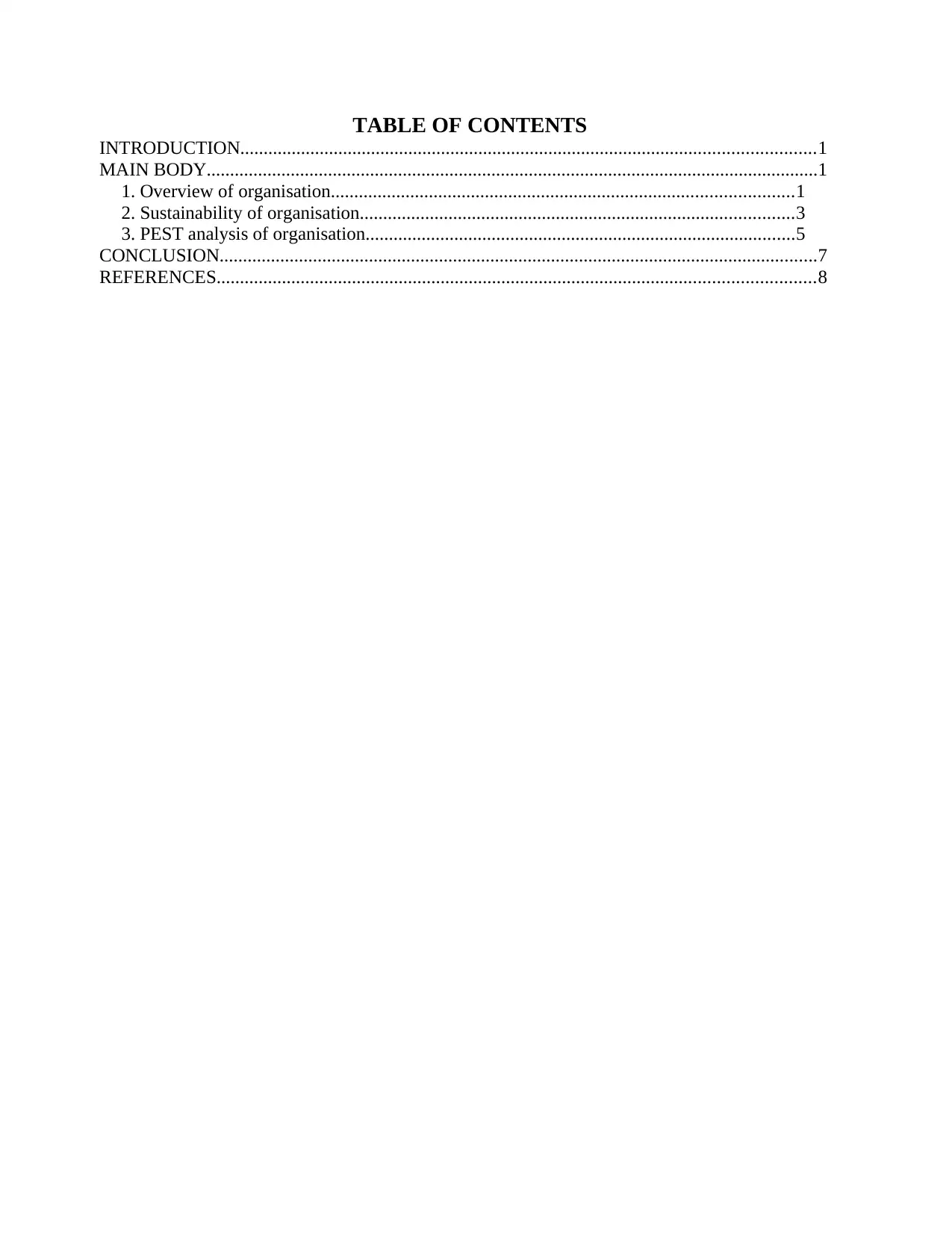
TABLE OF CONTENTS
INTRODUCTION...........................................................................................................................1
MAIN BODY...................................................................................................................................1
1. Overview of organisation...................................................................................................1
2. Sustainability of organisation.............................................................................................3
3. PEST analysis of organisation............................................................................................5
CONCLUSION................................................................................................................................7
REFERENCES................................................................................................................................8
INTRODUCTION...........................................................................................................................1
MAIN BODY...................................................................................................................................1
1. Overview of organisation...................................................................................................1
2. Sustainability of organisation.............................................................................................3
3. PEST analysis of organisation............................................................................................5
CONCLUSION................................................................................................................................7
REFERENCES................................................................................................................................8
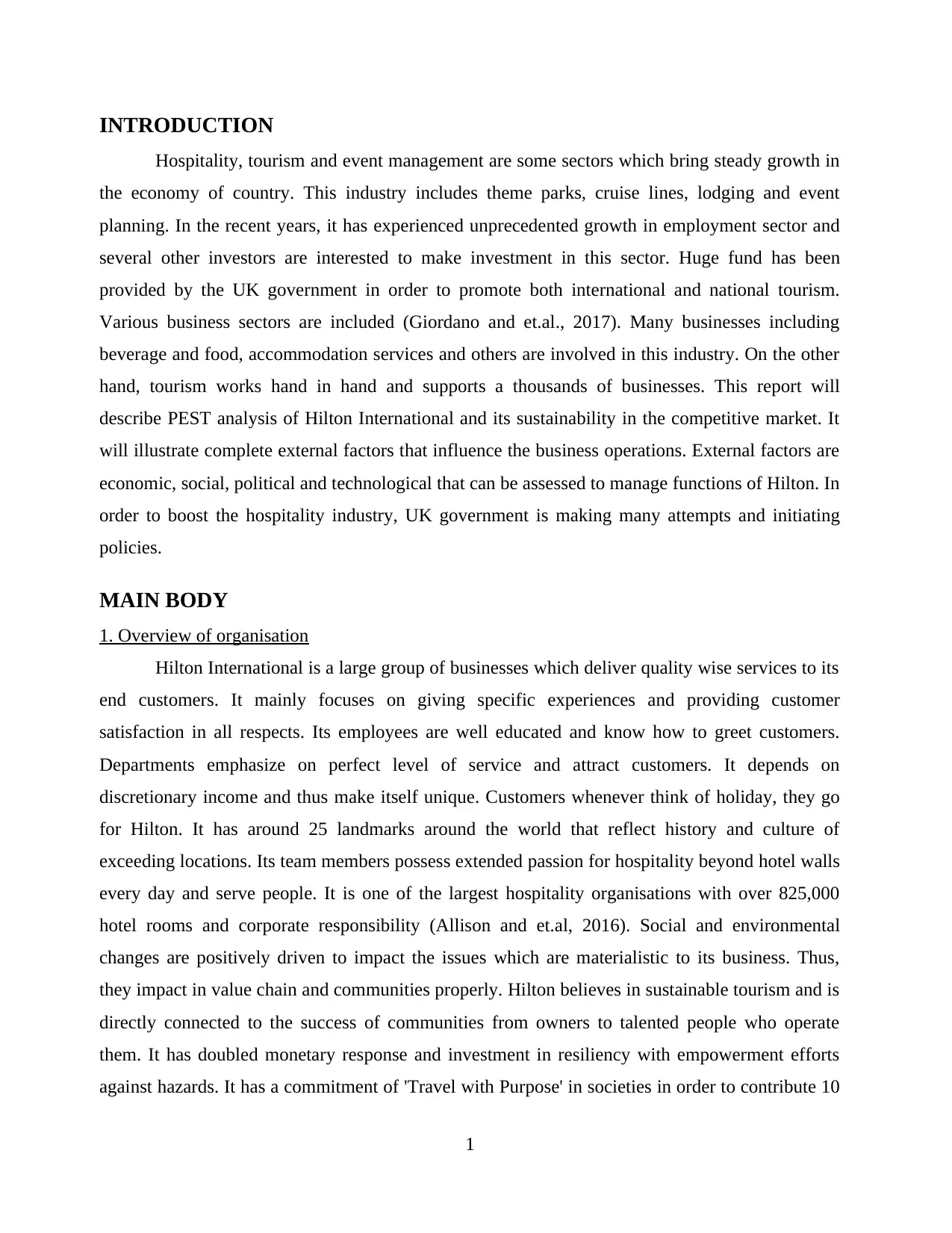
INTRODUCTION
Hospitality, tourism and event management are some sectors which bring steady growth in
the economy of country. This industry includes theme parks, cruise lines, lodging and event
planning. In the recent years, it has experienced unprecedented growth in employment sector and
several other investors are interested to make investment in this sector. Huge fund has been
provided by the UK government in order to promote both international and national tourism.
Various business sectors are included (Giordano and et.al., 2017). Many businesses including
beverage and food, accommodation services and others are involved in this industry. On the other
hand, tourism works hand in hand and supports a thousands of businesses. This report will
describe PEST analysis of Hilton International and its sustainability in the competitive market. It
will illustrate complete external factors that influence the business operations. External factors are
economic, social, political and technological that can be assessed to manage functions of Hilton. In
order to boost the hospitality industry, UK government is making many attempts and initiating
policies.
MAIN BODY
1. Overview of organisation
Hilton International is a large group of businesses which deliver quality wise services to its
end customers. It mainly focuses on giving specific experiences and providing customer
satisfaction in all respects. Its employees are well educated and know how to greet customers.
Departments emphasize on perfect level of service and attract customers. It depends on
discretionary income and thus make itself unique. Customers whenever think of holiday, they go
for Hilton. It has around 25 landmarks around the world that reflect history and culture of
exceeding locations. Its team members possess extended passion for hospitality beyond hotel walls
every day and serve people. It is one of the largest hospitality organisations with over 825,000
hotel rooms and corporate responsibility (Allison and et.al, 2016). Social and environmental
changes are positively driven to impact the issues which are materialistic to its business. Thus,
they impact in value chain and communities properly. Hilton believes in sustainable tourism and is
directly connected to the success of communities from owners to talented people who operate
them. It has doubled monetary response and investment in resiliency with empowerment efforts
against hazards. It has a commitment of 'Travel with Purpose' in societies in order to contribute 10
1
Hospitality, tourism and event management are some sectors which bring steady growth in
the economy of country. This industry includes theme parks, cruise lines, lodging and event
planning. In the recent years, it has experienced unprecedented growth in employment sector and
several other investors are interested to make investment in this sector. Huge fund has been
provided by the UK government in order to promote both international and national tourism.
Various business sectors are included (Giordano and et.al., 2017). Many businesses including
beverage and food, accommodation services and others are involved in this industry. On the other
hand, tourism works hand in hand and supports a thousands of businesses. This report will
describe PEST analysis of Hilton International and its sustainability in the competitive market. It
will illustrate complete external factors that influence the business operations. External factors are
economic, social, political and technological that can be assessed to manage functions of Hilton. In
order to boost the hospitality industry, UK government is making many attempts and initiating
policies.
MAIN BODY
1. Overview of organisation
Hilton International is a large group of businesses which deliver quality wise services to its
end customers. It mainly focuses on giving specific experiences and providing customer
satisfaction in all respects. Its employees are well educated and know how to greet customers.
Departments emphasize on perfect level of service and attract customers. It depends on
discretionary income and thus make itself unique. Customers whenever think of holiday, they go
for Hilton. It has around 25 landmarks around the world that reflect history and culture of
exceeding locations. Its team members possess extended passion for hospitality beyond hotel walls
every day and serve people. It is one of the largest hospitality organisations with over 825,000
hotel rooms and corporate responsibility (Allison and et.al, 2016). Social and environmental
changes are positively driven to impact the issues which are materialistic to its business. Thus,
they impact in value chain and communities properly. Hilton believes in sustainable tourism and is
directly connected to the success of communities from owners to talented people who operate
them. It has doubled monetary response and investment in resiliency with empowerment efforts
against hazards. It has a commitment of 'Travel with Purpose' in societies in order to contribute 10
1
⊘ This is a preview!⊘
Do you want full access?
Subscribe today to unlock all pages.

Trusted by 1+ million students worldwide
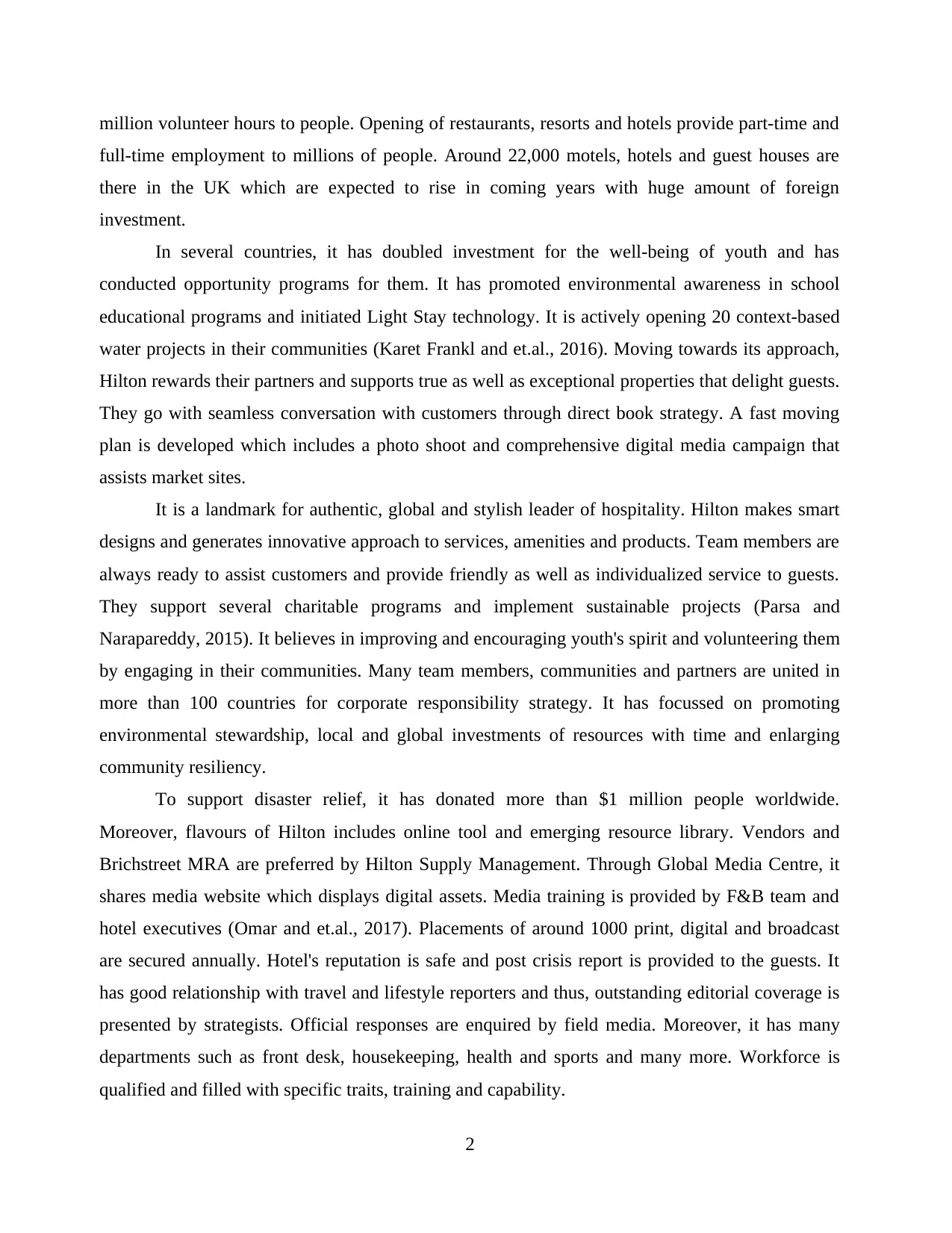
million volunteer hours to people. Opening of restaurants, resorts and hotels provide part-time and
full-time employment to millions of people. Around 22,000 motels, hotels and guest houses are
there in the UK which are expected to rise in coming years with huge amount of foreign
investment.
In several countries, it has doubled investment for the well-being of youth and has
conducted opportunity programs for them. It has promoted environmental awareness in school
educational programs and initiated Light Stay technology. It is actively opening 20 context-based
water projects in their communities (Karet Frankl and et.al., 2016). Moving towards its approach,
Hilton rewards their partners and supports true as well as exceptional properties that delight guests.
They go with seamless conversation with customers through direct book strategy. A fast moving
plan is developed which includes a photo shoot and comprehensive digital media campaign that
assists market sites.
It is a landmark for authentic, global and stylish leader of hospitality. Hilton makes smart
designs and generates innovative approach to services, amenities and products. Team members are
always ready to assist customers and provide friendly as well as individualized service to guests.
They support several charitable programs and implement sustainable projects (Parsa and
Narapareddy, 2015). It believes in improving and encouraging youth's spirit and volunteering them
by engaging in their communities. Many team members, communities and partners are united in
more than 100 countries for corporate responsibility strategy. It has focussed on promoting
environmental stewardship, local and global investments of resources with time and enlarging
community resiliency.
To support disaster relief, it has donated more than $1 million people worldwide.
Moreover, flavours of Hilton includes online tool and emerging resource library. Vendors and
Brichstreet MRA are preferred by Hilton Supply Management. Through Global Media Centre, it
shares media website which displays digital assets. Media training is provided by F&B team and
hotel executives (Omar and et.al., 2017). Placements of around 1000 print, digital and broadcast
are secured annually. Hotel's reputation is safe and post crisis report is provided to the guests. It
has good relationship with travel and lifestyle reporters and thus, outstanding editorial coverage is
presented by strategists. Official responses are enquired by field media. Moreover, it has many
departments such as front desk, housekeeping, health and sports and many more. Workforce is
qualified and filled with specific traits, training and capability.
2
full-time employment to millions of people. Around 22,000 motels, hotels and guest houses are
there in the UK which are expected to rise in coming years with huge amount of foreign
investment.
In several countries, it has doubled investment for the well-being of youth and has
conducted opportunity programs for them. It has promoted environmental awareness in school
educational programs and initiated Light Stay technology. It is actively opening 20 context-based
water projects in their communities (Karet Frankl and et.al., 2016). Moving towards its approach,
Hilton rewards their partners and supports true as well as exceptional properties that delight guests.
They go with seamless conversation with customers through direct book strategy. A fast moving
plan is developed which includes a photo shoot and comprehensive digital media campaign that
assists market sites.
It is a landmark for authentic, global and stylish leader of hospitality. Hilton makes smart
designs and generates innovative approach to services, amenities and products. Team members are
always ready to assist customers and provide friendly as well as individualized service to guests.
They support several charitable programs and implement sustainable projects (Parsa and
Narapareddy, 2015). It believes in improving and encouraging youth's spirit and volunteering them
by engaging in their communities. Many team members, communities and partners are united in
more than 100 countries for corporate responsibility strategy. It has focussed on promoting
environmental stewardship, local and global investments of resources with time and enlarging
community resiliency.
To support disaster relief, it has donated more than $1 million people worldwide.
Moreover, flavours of Hilton includes online tool and emerging resource library. Vendors and
Brichstreet MRA are preferred by Hilton Supply Management. Through Global Media Centre, it
shares media website which displays digital assets. Media training is provided by F&B team and
hotel executives (Omar and et.al., 2017). Placements of around 1000 print, digital and broadcast
are secured annually. Hotel's reputation is safe and post crisis report is provided to the guests. It
has good relationship with travel and lifestyle reporters and thus, outstanding editorial coverage is
presented by strategists. Official responses are enquired by field media. Moreover, it has many
departments such as front desk, housekeeping, health and sports and many more. Workforce is
qualified and filled with specific traits, training and capability.
2
Paraphrase This Document
Need a fresh take? Get an instant paraphrase of this document with our AI Paraphraser
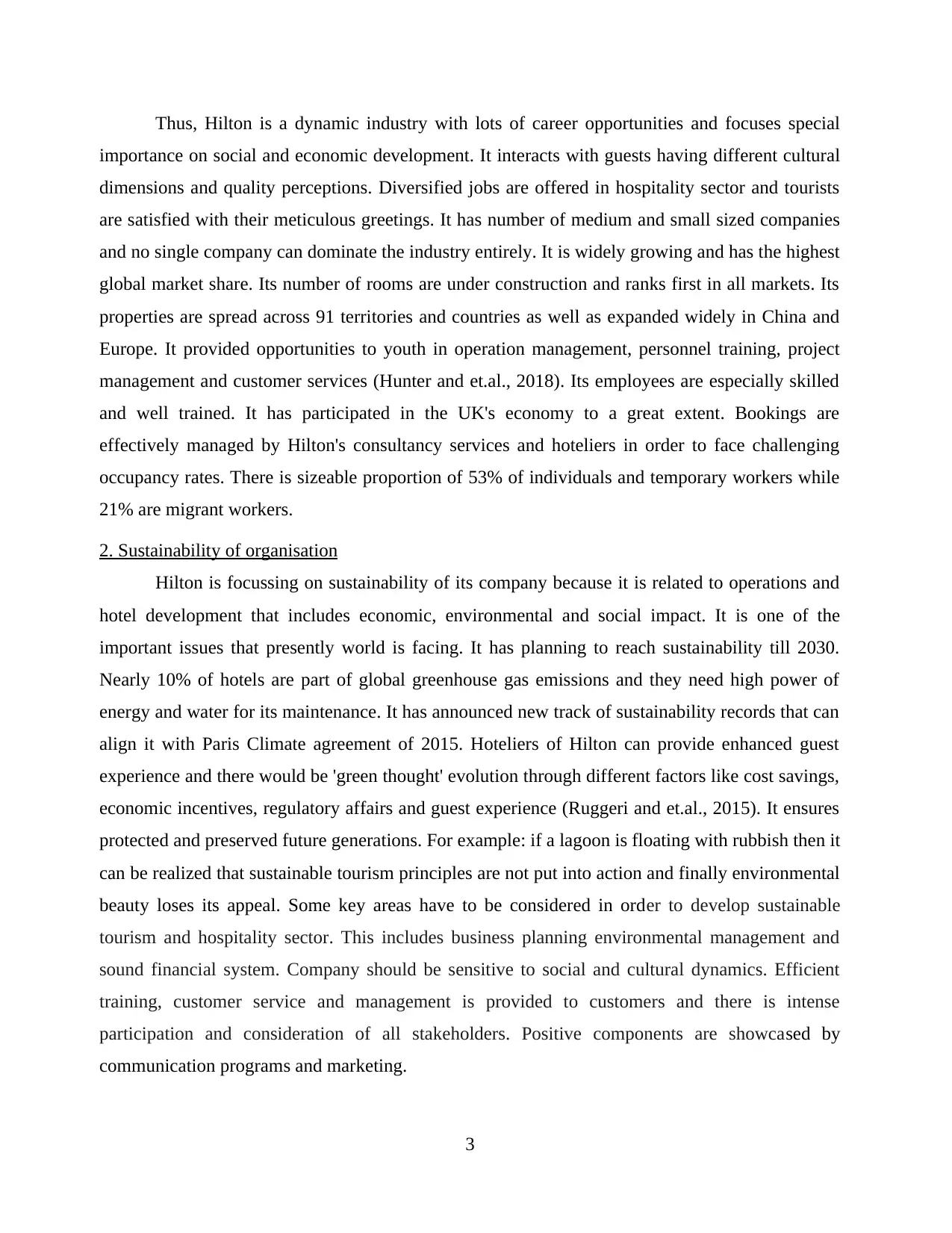
Thus, Hilton is a dynamic industry with lots of career opportunities and focuses special
importance on social and economic development. It interacts with guests having different cultural
dimensions and quality perceptions. Diversified jobs are offered in hospitality sector and tourists
are satisfied with their meticulous greetings. It has number of medium and small sized companies
and no single company can dominate the industry entirely. It is widely growing and has the highest
global market share. Its number of rooms are under construction and ranks first in all markets. Its
properties are spread across 91 territories and countries as well as expanded widely in China and
Europe. It provided opportunities to youth in operation management, personnel training, project
management and customer services (Hunter and et.al., 2018). Its employees are especially skilled
and well trained. It has participated in the UK's economy to a great extent. Bookings are
effectively managed by Hilton's consultancy services and hoteliers in order to face challenging
occupancy rates. There is sizeable proportion of 53% of individuals and temporary workers while
21% are migrant workers.
2. Sustainability of organisation
Hilton is focussing on sustainability of its company because it is related to operations and
hotel development that includes economic, environmental and social impact. It is one of the
important issues that presently world is facing. It has planning to reach sustainability till 2030.
Nearly 10% of hotels are part of global greenhouse gas emissions and they need high power of
energy and water for its maintenance. It has announced new track of sustainability records that can
align it with Paris Climate agreement of 2015. Hoteliers of Hilton can provide enhanced guest
experience and there would be 'green thought' evolution through different factors like cost savings,
economic incentives, regulatory affairs and guest experience (Ruggeri and et.al., 2015). It ensures
protected and preserved future generations. For example: if a lagoon is floating with rubbish then it
can be realized that sustainable tourism principles are not put into action and finally environmental
beauty loses its appeal. Some key areas have to be considered in order to develop sustainable
tourism and hospitality sector. This includes business planning environmental management and
sound financial system. Company should be sensitive to social and cultural dynamics. Efficient
training, customer service and management is provided to customers and there is intense
participation and consideration of all stakeholders. Positive components are showcased by
communication programs and marketing.
3
importance on social and economic development. It interacts with guests having different cultural
dimensions and quality perceptions. Diversified jobs are offered in hospitality sector and tourists
are satisfied with their meticulous greetings. It has number of medium and small sized companies
and no single company can dominate the industry entirely. It is widely growing and has the highest
global market share. Its number of rooms are under construction and ranks first in all markets. Its
properties are spread across 91 territories and countries as well as expanded widely in China and
Europe. It provided opportunities to youth in operation management, personnel training, project
management and customer services (Hunter and et.al., 2018). Its employees are especially skilled
and well trained. It has participated in the UK's economy to a great extent. Bookings are
effectively managed by Hilton's consultancy services and hoteliers in order to face challenging
occupancy rates. There is sizeable proportion of 53% of individuals and temporary workers while
21% are migrant workers.
2. Sustainability of organisation
Hilton is focussing on sustainability of its company because it is related to operations and
hotel development that includes economic, environmental and social impact. It is one of the
important issues that presently world is facing. It has planning to reach sustainability till 2030.
Nearly 10% of hotels are part of global greenhouse gas emissions and they need high power of
energy and water for its maintenance. It has announced new track of sustainability records that can
align it with Paris Climate agreement of 2015. Hoteliers of Hilton can provide enhanced guest
experience and there would be 'green thought' evolution through different factors like cost savings,
economic incentives, regulatory affairs and guest experience (Ruggeri and et.al., 2015). It ensures
protected and preserved future generations. For example: if a lagoon is floating with rubbish then it
can be realized that sustainable tourism principles are not put into action and finally environmental
beauty loses its appeal. Some key areas have to be considered in order to develop sustainable
tourism and hospitality sector. This includes business planning environmental management and
sound financial system. Company should be sensitive to social and cultural dynamics. Efficient
training, customer service and management is provided to customers and there is intense
participation and consideration of all stakeholders. Positive components are showcased by
communication programs and marketing.
3
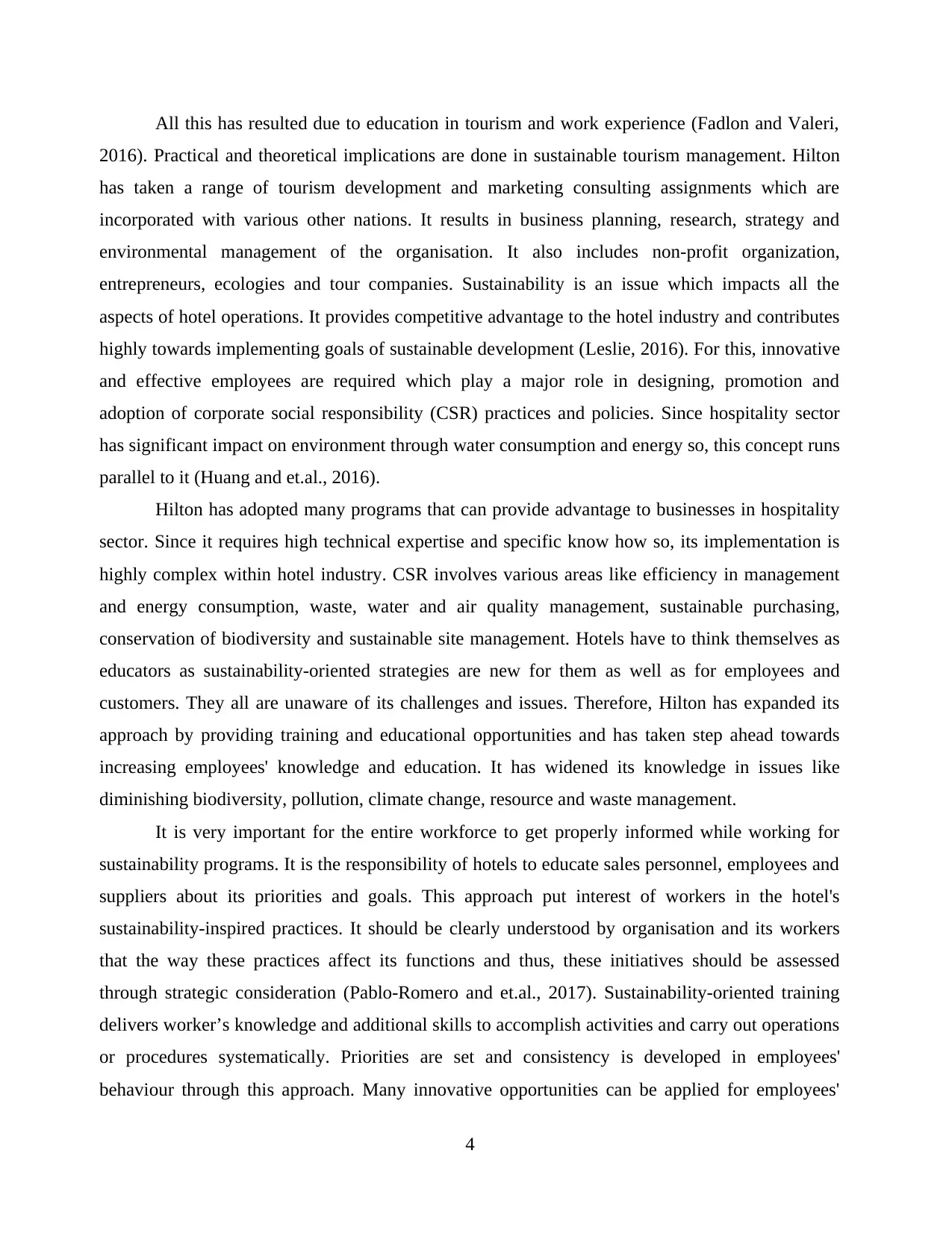
All this has resulted due to education in tourism and work experience (Fadlon and Valeri,
2016). Practical and theoretical implications are done in sustainable tourism management. Hilton
has taken a range of tourism development and marketing consulting assignments which are
incorporated with various other nations. It results in business planning, research, strategy and
environmental management of the organisation. It also includes non-profit organization,
entrepreneurs, ecologies and tour companies. Sustainability is an issue which impacts all the
aspects of hotel operations. It provides competitive advantage to the hotel industry and contributes
highly towards implementing goals of sustainable development (Leslie, 2016). For this, innovative
and effective employees are required which play a major role in designing, promotion and
adoption of corporate social responsibility (CSR) practices and policies. Since hospitality sector
has significant impact on environment through water consumption and energy so, this concept runs
parallel to it (Huang and et.al., 2016).
Hilton has adopted many programs that can provide advantage to businesses in hospitality
sector. Since it requires high technical expertise and specific know how so, its implementation is
highly complex within hotel industry. CSR involves various areas like efficiency in management
and energy consumption, waste, water and air quality management, sustainable purchasing,
conservation of biodiversity and sustainable site management. Hotels have to think themselves as
educators as sustainability-oriented strategies are new for them as well as for employees and
customers. They all are unaware of its challenges and issues. Therefore, Hilton has expanded its
approach by providing training and educational opportunities and has taken step ahead towards
increasing employees' knowledge and education. It has widened its knowledge in issues like
diminishing biodiversity, pollution, climate change, resource and waste management.
It is very important for the entire workforce to get properly informed while working for
sustainability programs. It is the responsibility of hotels to educate sales personnel, employees and
suppliers about its priorities and goals. This approach put interest of workers in the hotel's
sustainability-inspired practices. It should be clearly understood by organisation and its workers
that the way these practices affect its functions and thus, these initiatives should be assessed
through strategic consideration (Pablo-Romero and et.al., 2017). Sustainability-oriented training
delivers worker’s knowledge and additional skills to accomplish activities and carry out operations
or procedures systematically. Priorities are set and consistency is developed in employees'
behaviour through this approach. Many innovative opportunities can be applied for employees'
4
2016). Practical and theoretical implications are done in sustainable tourism management. Hilton
has taken a range of tourism development and marketing consulting assignments which are
incorporated with various other nations. It results in business planning, research, strategy and
environmental management of the organisation. It also includes non-profit organization,
entrepreneurs, ecologies and tour companies. Sustainability is an issue which impacts all the
aspects of hotel operations. It provides competitive advantage to the hotel industry and contributes
highly towards implementing goals of sustainable development (Leslie, 2016). For this, innovative
and effective employees are required which play a major role in designing, promotion and
adoption of corporate social responsibility (CSR) practices and policies. Since hospitality sector
has significant impact on environment through water consumption and energy so, this concept runs
parallel to it (Huang and et.al., 2016).
Hilton has adopted many programs that can provide advantage to businesses in hospitality
sector. Since it requires high technical expertise and specific know how so, its implementation is
highly complex within hotel industry. CSR involves various areas like efficiency in management
and energy consumption, waste, water and air quality management, sustainable purchasing,
conservation of biodiversity and sustainable site management. Hotels have to think themselves as
educators as sustainability-oriented strategies are new for them as well as for employees and
customers. They all are unaware of its challenges and issues. Therefore, Hilton has expanded its
approach by providing training and educational opportunities and has taken step ahead towards
increasing employees' knowledge and education. It has widened its knowledge in issues like
diminishing biodiversity, pollution, climate change, resource and waste management.
It is very important for the entire workforce to get properly informed while working for
sustainability programs. It is the responsibility of hotels to educate sales personnel, employees and
suppliers about its priorities and goals. This approach put interest of workers in the hotel's
sustainability-inspired practices. It should be clearly understood by organisation and its workers
that the way these practices affect its functions and thus, these initiatives should be assessed
through strategic consideration (Pablo-Romero and et.al., 2017). Sustainability-oriented training
delivers worker’s knowledge and additional skills to accomplish activities and carry out operations
or procedures systematically. Priorities are set and consistency is developed in employees'
behaviour through this approach. Many innovative opportunities can be applied for employees'
4
⊘ This is a preview!⊘
Do you want full access?
Subscribe today to unlock all pages.

Trusted by 1+ million students worldwide
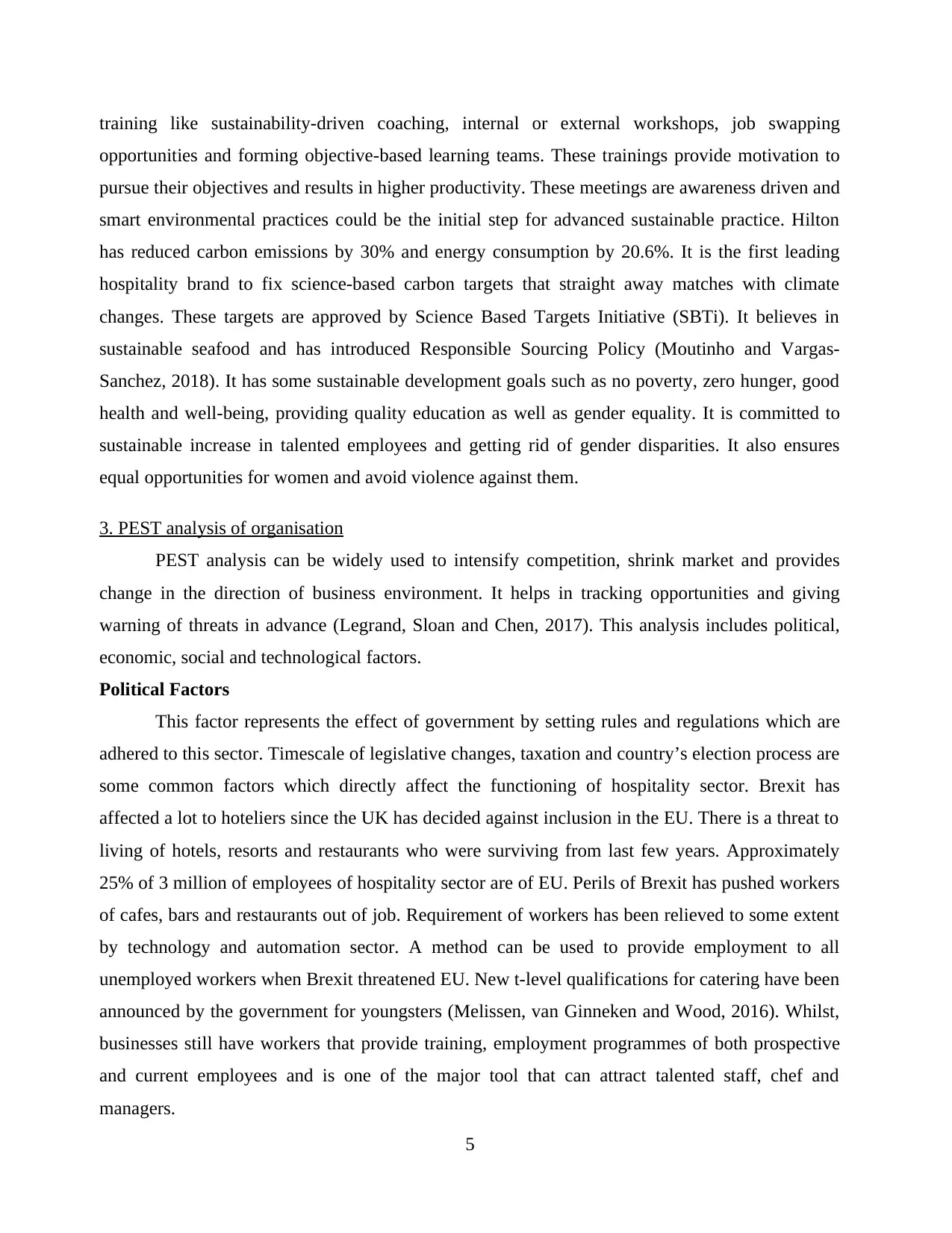
training like sustainability-driven coaching, internal or external workshops, job swapping
opportunities and forming objective-based learning teams. These trainings provide motivation to
pursue their objectives and results in higher productivity. These meetings are awareness driven and
smart environmental practices could be the initial step for advanced sustainable practice. Hilton
has reduced carbon emissions by 30% and energy consumption by 20.6%. It is the first leading
hospitality brand to fix science-based carbon targets that straight away matches with climate
changes. These targets are approved by Science Based Targets Initiative (SBTi). It believes in
sustainable seafood and has introduced Responsible Sourcing Policy (Moutinho and Vargas-
Sanchez, 2018). It has some sustainable development goals such as no poverty, zero hunger, good
health and well-being, providing quality education as well as gender equality. It is committed to
sustainable increase in talented employees and getting rid of gender disparities. It also ensures
equal opportunities for women and avoid violence against them.
3. PEST analysis of organisation
PEST analysis can be widely used to intensify competition, shrink market and provides
change in the direction of business environment. It helps in tracking opportunities and giving
warning of threats in advance (Legrand, Sloan and Chen, 2017). This analysis includes political,
economic, social and technological factors.
Political Factors
This factor represents the effect of government by setting rules and regulations which are
adhered to this sector. Timescale of legislative changes, taxation and country’s election process are
some common factors which directly affect the functioning of hospitality sector. Brexit has
affected a lot to hoteliers since the UK has decided against inclusion in the EU. There is a threat to
living of hotels, resorts and restaurants who were surviving from last few years. Approximately
25% of 3 million of employees of hospitality sector are of EU. Perils of Brexit has pushed workers
of cafes, bars and restaurants out of job. Requirement of workers has been relieved to some extent
by technology and automation sector. A method can be used to provide employment to all
unemployed workers when Brexit threatened EU. New t-level qualifications for catering have been
announced by the government for youngsters (Melissen, van Ginneken and Wood, 2016). Whilst,
businesses still have workers that provide training, employment programmes of both prospective
and current employees and is one of the major tool that can attract talented staff, chef and
managers.
5
opportunities and forming objective-based learning teams. These trainings provide motivation to
pursue their objectives and results in higher productivity. These meetings are awareness driven and
smart environmental practices could be the initial step for advanced sustainable practice. Hilton
has reduced carbon emissions by 30% and energy consumption by 20.6%. It is the first leading
hospitality brand to fix science-based carbon targets that straight away matches with climate
changes. These targets are approved by Science Based Targets Initiative (SBTi). It believes in
sustainable seafood and has introduced Responsible Sourcing Policy (Moutinho and Vargas-
Sanchez, 2018). It has some sustainable development goals such as no poverty, zero hunger, good
health and well-being, providing quality education as well as gender equality. It is committed to
sustainable increase in talented employees and getting rid of gender disparities. It also ensures
equal opportunities for women and avoid violence against them.
3. PEST analysis of organisation
PEST analysis can be widely used to intensify competition, shrink market and provides
change in the direction of business environment. It helps in tracking opportunities and giving
warning of threats in advance (Legrand, Sloan and Chen, 2017). This analysis includes political,
economic, social and technological factors.
Political Factors
This factor represents the effect of government by setting rules and regulations which are
adhered to this sector. Timescale of legislative changes, taxation and country’s election process are
some common factors which directly affect the functioning of hospitality sector. Brexit has
affected a lot to hoteliers since the UK has decided against inclusion in the EU. There is a threat to
living of hotels, resorts and restaurants who were surviving from last few years. Approximately
25% of 3 million of employees of hospitality sector are of EU. Perils of Brexit has pushed workers
of cafes, bars and restaurants out of job. Requirement of workers has been relieved to some extent
by technology and automation sector. A method can be used to provide employment to all
unemployed workers when Brexit threatened EU. New t-level qualifications for catering have been
announced by the government for youngsters (Melissen, van Ginneken and Wood, 2016). Whilst,
businesses still have workers that provide training, employment programmes of both prospective
and current employees and is one of the major tool that can attract talented staff, chef and
managers.
5
Paraphrase This Document
Need a fresh take? Get an instant paraphrase of this document with our AI Paraphraser
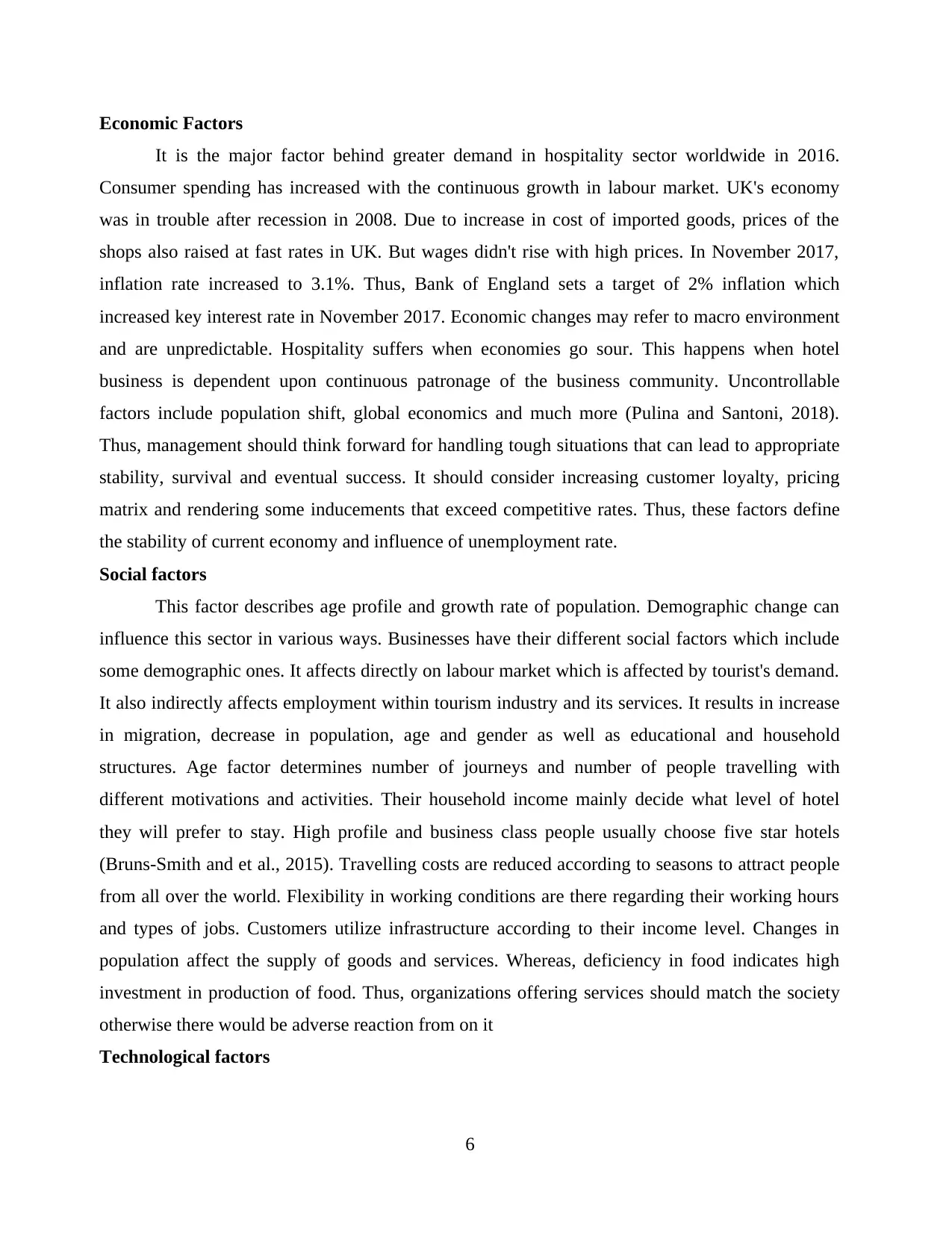
Economic Factors
It is the major factor behind greater demand in hospitality sector worldwide in 2016.
Consumer spending has increased with the continuous growth in labour market. UK's economy
was in trouble after recession in 2008. Due to increase in cost of imported goods, prices of the
shops also raised at fast rates in UK. But wages didn't rise with high prices. In November 2017,
inflation rate increased to 3.1%. Thus, Bank of England sets a target of 2% inflation which
increased key interest rate in November 2017. Economic changes may refer to macro environment
and are unpredictable. Hospitality suffers when economies go sour. This happens when hotel
business is dependent upon continuous patronage of the business community. Uncontrollable
factors include population shift, global economics and much more (Pulina and Santoni, 2018).
Thus, management should think forward for handling tough situations that can lead to appropriate
stability, survival and eventual success. It should consider increasing customer loyalty, pricing
matrix and rendering some inducements that exceed competitive rates. Thus, these factors define
the stability of current economy and influence of unemployment rate.
Social factors
This factor describes age profile and growth rate of population. Demographic change can
influence this sector in various ways. Businesses have their different social factors which include
some demographic ones. It affects directly on labour market which is affected by tourist's demand.
It also indirectly affects employment within tourism industry and its services. It results in increase
in migration, decrease in population, age and gender as well as educational and household
structures. Age factor determines number of journeys and number of people travelling with
different motivations and activities. Their household income mainly decide what level of hotel
they will prefer to stay. High profile and business class people usually choose five star hotels
(Bruns-Smith and et al., 2015). Travelling costs are reduced according to seasons to attract people
from all over the world. Flexibility in working conditions are there regarding their working hours
and types of jobs. Customers utilize infrastructure according to their income level. Changes in
population affect the supply of goods and services. Whereas, deficiency in food indicates high
investment in production of food. Thus, organizations offering services should match the society
otherwise there would be adverse reaction from on it
Technological factors
6
It is the major factor behind greater demand in hospitality sector worldwide in 2016.
Consumer spending has increased with the continuous growth in labour market. UK's economy
was in trouble after recession in 2008. Due to increase in cost of imported goods, prices of the
shops also raised at fast rates in UK. But wages didn't rise with high prices. In November 2017,
inflation rate increased to 3.1%. Thus, Bank of England sets a target of 2% inflation which
increased key interest rate in November 2017. Economic changes may refer to macro environment
and are unpredictable. Hospitality suffers when economies go sour. This happens when hotel
business is dependent upon continuous patronage of the business community. Uncontrollable
factors include population shift, global economics and much more (Pulina and Santoni, 2018).
Thus, management should think forward for handling tough situations that can lead to appropriate
stability, survival and eventual success. It should consider increasing customer loyalty, pricing
matrix and rendering some inducements that exceed competitive rates. Thus, these factors define
the stability of current economy and influence of unemployment rate.
Social factors
This factor describes age profile and growth rate of population. Demographic change can
influence this sector in various ways. Businesses have their different social factors which include
some demographic ones. It affects directly on labour market which is affected by tourist's demand.
It also indirectly affects employment within tourism industry and its services. It results in increase
in migration, decrease in population, age and gender as well as educational and household
structures. Age factor determines number of journeys and number of people travelling with
different motivations and activities. Their household income mainly decide what level of hotel
they will prefer to stay. High profile and business class people usually choose five star hotels
(Bruns-Smith and et al., 2015). Travelling costs are reduced according to seasons to attract people
from all over the world. Flexibility in working conditions are there regarding their working hours
and types of jobs. Customers utilize infrastructure according to their income level. Changes in
population affect the supply of goods and services. Whereas, deficiency in food indicates high
investment in production of food. Thus, organizations offering services should match the society
otherwise there would be adverse reaction from on it
Technological factors
6
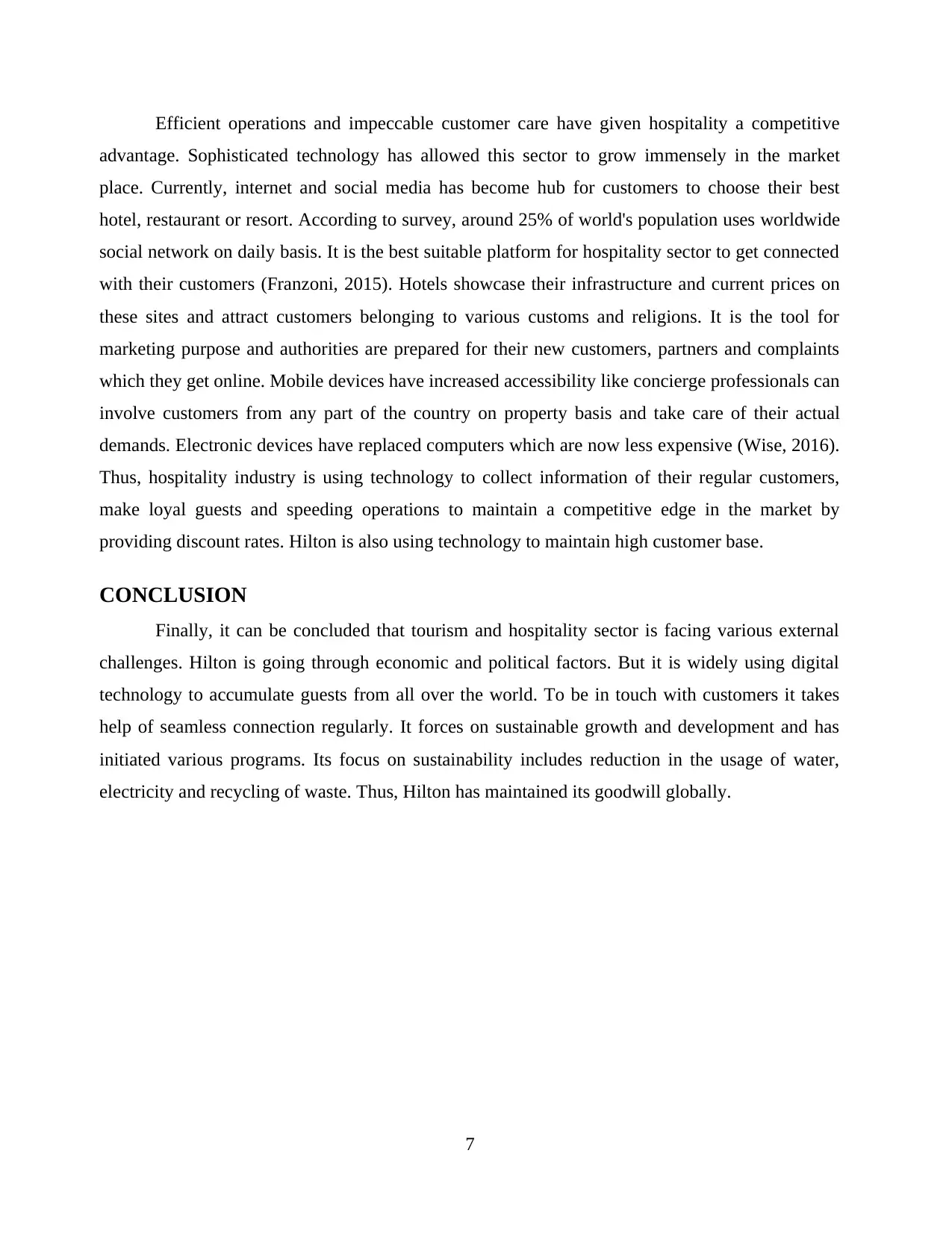
Efficient operations and impeccable customer care have given hospitality a competitive
advantage. Sophisticated technology has allowed this sector to grow immensely in the market
place. Currently, internet and social media has become hub for customers to choose their best
hotel, restaurant or resort. According to survey, around 25% of world's population uses worldwide
social network on daily basis. It is the best suitable platform for hospitality sector to get connected
with their customers (Franzoni, 2015). Hotels showcase their infrastructure and current prices on
these sites and attract customers belonging to various customs and religions. It is the tool for
marketing purpose and authorities are prepared for their new customers, partners and complaints
which they get online. Mobile devices have increased accessibility like concierge professionals can
involve customers from any part of the country on property basis and take care of their actual
demands. Electronic devices have replaced computers which are now less expensive (Wise, 2016).
Thus, hospitality industry is using technology to collect information of their regular customers,
make loyal guests and speeding operations to maintain a competitive edge in the market by
providing discount rates. Hilton is also using technology to maintain high customer base.
CONCLUSION
Finally, it can be concluded that tourism and hospitality sector is facing various external
challenges. Hilton is going through economic and political factors. But it is widely using digital
technology to accumulate guests from all over the world. To be in touch with customers it takes
help of seamless connection regularly. It forces on sustainable growth and development and has
initiated various programs. Its focus on sustainability includes reduction in the usage of water,
electricity and recycling of waste. Thus, Hilton has maintained its goodwill globally.
7
advantage. Sophisticated technology has allowed this sector to grow immensely in the market
place. Currently, internet and social media has become hub for customers to choose their best
hotel, restaurant or resort. According to survey, around 25% of world's population uses worldwide
social network on daily basis. It is the best suitable platform for hospitality sector to get connected
with their customers (Franzoni, 2015). Hotels showcase their infrastructure and current prices on
these sites and attract customers belonging to various customs and religions. It is the tool for
marketing purpose and authorities are prepared for their new customers, partners and complaints
which they get online. Mobile devices have increased accessibility like concierge professionals can
involve customers from any part of the country on property basis and take care of their actual
demands. Electronic devices have replaced computers which are now less expensive (Wise, 2016).
Thus, hospitality industry is using technology to collect information of their regular customers,
make loyal guests and speeding operations to maintain a competitive edge in the market by
providing discount rates. Hilton is also using technology to maintain high customer base.
CONCLUSION
Finally, it can be concluded that tourism and hospitality sector is facing various external
challenges. Hilton is going through economic and political factors. But it is widely using digital
technology to accumulate guests from all over the world. To be in touch with customers it takes
help of seamless connection regularly. It forces on sustainable growth and development and has
initiated various programs. Its focus on sustainability includes reduction in the usage of water,
electricity and recycling of waste. Thus, Hilton has maintained its goodwill globally.
7
⊘ This is a preview!⊘
Do you want full access?
Subscribe today to unlock all pages.

Trusted by 1+ million students worldwide
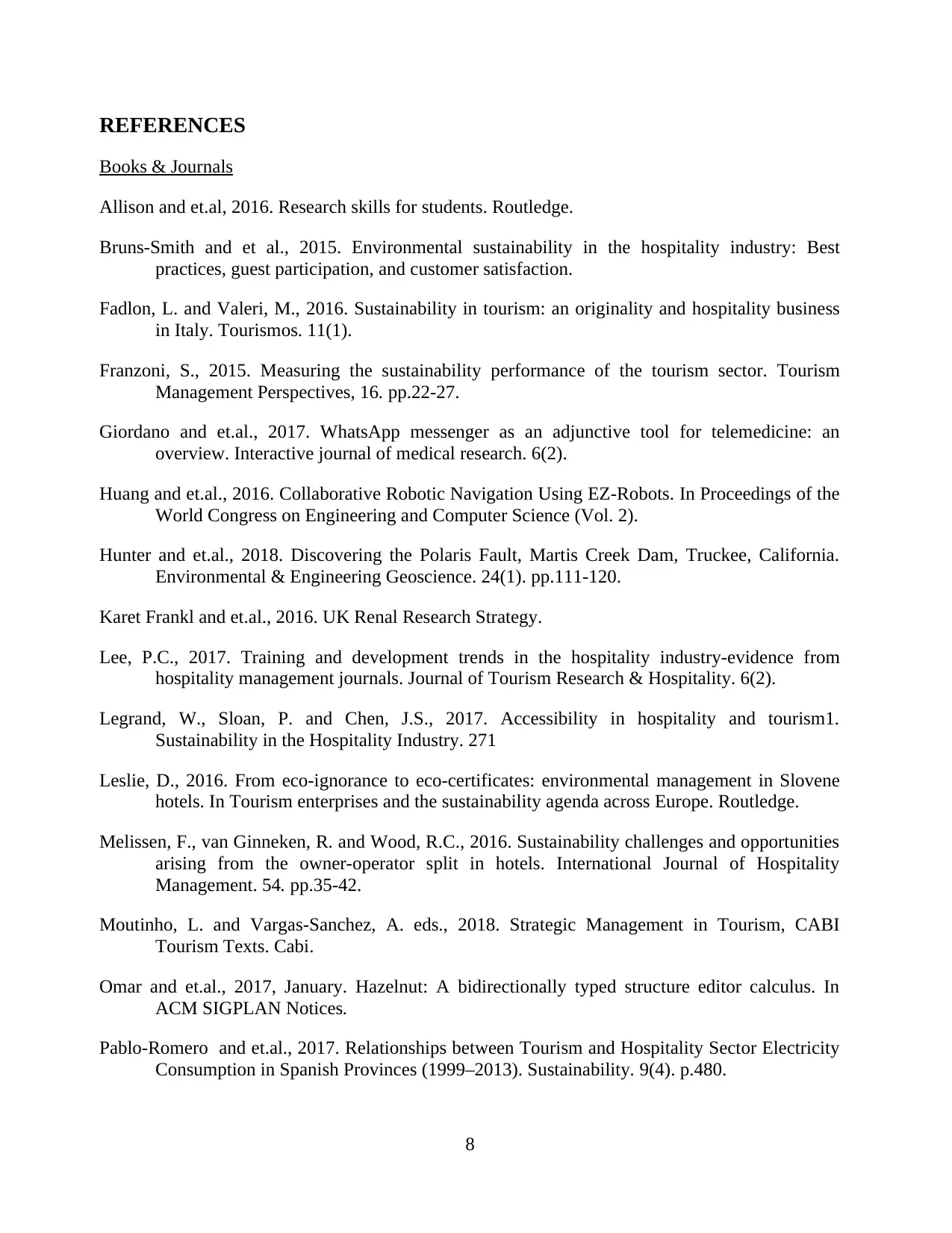
REFERENCES
Books & Journals
Allison and et.al, 2016. Research skills for students. Routledge.
Bruns-Smith and et al., 2015. Environmental sustainability in the hospitality industry: Best
practices, guest participation, and customer satisfaction.
Fadlon, L. and Valeri, M., 2016. Sustainability in tourism: an originality and hospitality business
in Italy. Tourismos. 11(1).
Franzoni, S., 2015. Measuring the sustainability performance of the tourism sector. Tourism
Management Perspectives, 16. pp.22-27.
Giordano and et.al., 2017. WhatsApp messenger as an adjunctive tool for telemedicine: an
overview. Interactive journal of medical research. 6(2).
Huang and et.al., 2016. Collaborative Robotic Navigation Using EZ-Robots. In Proceedings of the
World Congress on Engineering and Computer Science (Vol. 2).
Hunter and et.al., 2018. Discovering the Polaris Fault, Martis Creek Dam, Truckee, California.
Environmental & Engineering Geoscience. 24(1). pp.111-120.
Karet Frankl and et.al., 2016. UK Renal Research Strategy.
Lee, P.C., 2017. Training and development trends in the hospitality industry-evidence from
hospitality management journals. Journal of Tourism Research & Hospitality. 6(2).
Legrand, W., Sloan, P. and Chen, J.S., 2017. Accessibility in hospitality and tourism1.
Sustainability in the Hospitality Industry. 271
Leslie, D., 2016. From eco-ignorance to eco-certificates: environmental management in Slovene
hotels. In Tourism enterprises and the sustainability agenda across Europe. Routledge.
Melissen, F., van Ginneken, R. and Wood, R.C., 2016. Sustainability challenges and opportunities
arising from the owner-operator split in hotels. International Journal of Hospitality
Management. 54. pp.35-42.
Moutinho, L. and Vargas-Sanchez, A. eds., 2018. Strategic Management in Tourism, CABI
Tourism Texts. Cabi.
Omar and et.al., 2017, January. Hazelnut: A bidirectionally typed structure editor calculus. In
ACM SIGPLAN Notices.
Pablo-Romero and et.al., 2017. Relationships between Tourism and Hospitality Sector Electricity
Consumption in Spanish Provinces (1999–2013). Sustainability. 9(4). p.480.
8
Books & Journals
Allison and et.al, 2016. Research skills for students. Routledge.
Bruns-Smith and et al., 2015. Environmental sustainability in the hospitality industry: Best
practices, guest participation, and customer satisfaction.
Fadlon, L. and Valeri, M., 2016. Sustainability in tourism: an originality and hospitality business
in Italy. Tourismos. 11(1).
Franzoni, S., 2015. Measuring the sustainability performance of the tourism sector. Tourism
Management Perspectives, 16. pp.22-27.
Giordano and et.al., 2017. WhatsApp messenger as an adjunctive tool for telemedicine: an
overview. Interactive journal of medical research. 6(2).
Huang and et.al., 2016. Collaborative Robotic Navigation Using EZ-Robots. In Proceedings of the
World Congress on Engineering and Computer Science (Vol. 2).
Hunter and et.al., 2018. Discovering the Polaris Fault, Martis Creek Dam, Truckee, California.
Environmental & Engineering Geoscience. 24(1). pp.111-120.
Karet Frankl and et.al., 2016. UK Renal Research Strategy.
Lee, P.C., 2017. Training and development trends in the hospitality industry-evidence from
hospitality management journals. Journal of Tourism Research & Hospitality. 6(2).
Legrand, W., Sloan, P. and Chen, J.S., 2017. Accessibility in hospitality and tourism1.
Sustainability in the Hospitality Industry. 271
Leslie, D., 2016. From eco-ignorance to eco-certificates: environmental management in Slovene
hotels. In Tourism enterprises and the sustainability agenda across Europe. Routledge.
Melissen, F., van Ginneken, R. and Wood, R.C., 2016. Sustainability challenges and opportunities
arising from the owner-operator split in hotels. International Journal of Hospitality
Management. 54. pp.35-42.
Moutinho, L. and Vargas-Sanchez, A. eds., 2018. Strategic Management in Tourism, CABI
Tourism Texts. Cabi.
Omar and et.al., 2017, January. Hazelnut: A bidirectionally typed structure editor calculus. In
ACM SIGPLAN Notices.
Pablo-Romero and et.al., 2017. Relationships between Tourism and Hospitality Sector Electricity
Consumption in Spanish Provinces (1999–2013). Sustainability. 9(4). p.480.
8
Paraphrase This Document
Need a fresh take? Get an instant paraphrase of this document with our AI Paraphraser
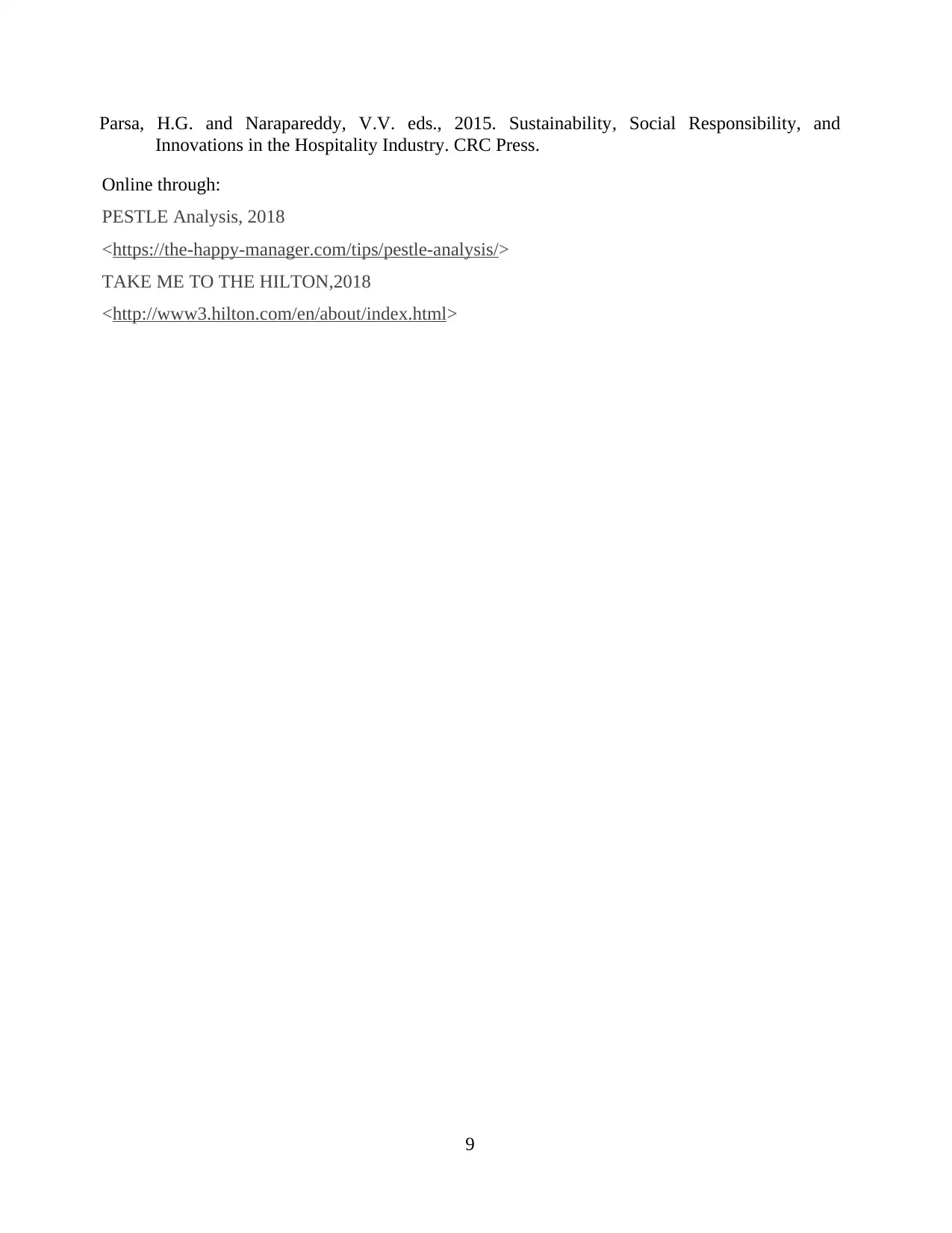
Parsa, H.G. and Narapareddy, V.V. eds., 2015. Sustainability, Social Responsibility, and
Innovations in the Hospitality Industry. CRC Press.
Online through:
PESTLE Analysis, 2018
<https://the-happy-manager.com/tips/pestle-analysis/>
TAKE ME TO THE HILTON,2018
<http://www3.hilton.com/en/about/index.html>
9
Innovations in the Hospitality Industry. CRC Press.
Online through:
PESTLE Analysis, 2018
<https://the-happy-manager.com/tips/pestle-analysis/>
TAKE ME TO THE HILTON,2018
<http://www3.hilton.com/en/about/index.html>
9
1 out of 11
Related Documents
Your All-in-One AI-Powered Toolkit for Academic Success.
+13062052269
info@desklib.com
Available 24*7 on WhatsApp / Email
![[object Object]](/_next/static/media/star-bottom.7253800d.svg)
Unlock your academic potential
Copyright © 2020–2026 A2Z Services. All Rights Reserved. Developed and managed by ZUCOL.





